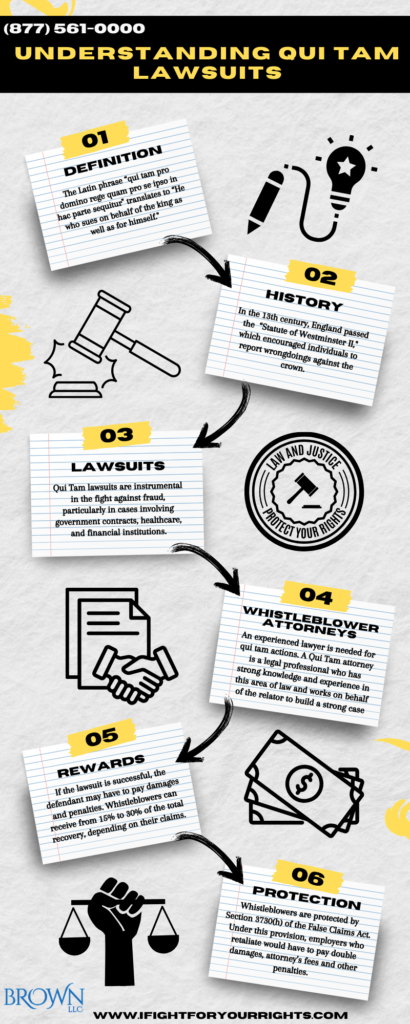What is a Qui Tam Lawsuit?

In the complex world of legal proceedings, one term that may not be as widely recognized as others is “Qui Tam.” But don’t let its obscurity fool you – Qui Tam lawsuits are a powerful tool in the fight against fraud, corruption, and deceit, helping protect government resources and taxpayers’ hard-earned money. In this comprehensive guide, we’ll explore the qui tam lawsuit, what it entails, its history, the role of a qui tam attorney, and its broader implications.
Qui Tam Meaning
The Latin phrase “qui tam pro domino rege quam pro se ipso in hac parte sequitur” translates to “He who sues on behalf of the king as well as for himself.” This phrase forms the basis of the term “Qui Tam.” It is a legal provision that allows a private individual, often referred to as a “relator,” to file a lawsuit on behalf of the government against a party or organization that has defrauded the government. In such cases, the government may join the lawsuit and share in the recovery.
A Brief History of Qui Tam Lawsuits
The origin of Qui Tam lawsuits can be traced back to English common law. In the 13th century, England passed the “Statute of Westminster II,” which encouraged individuals to report wrongdoings against the crown. Those who did so were entitled to a share of the recovered funds. This idea was later incorporated into American law, where Qui Tam provisions were included in the federal False Claims Act (FCA) of 1863.
Pronouncing Qui Tam
The pronunciation of “qui tam” often leaves many individuals puzzled, and it’s not uncommon to encounter various renditions. The most frequently used pronunciation is “kee tam” (rhyming with “Sam”). Alternatively, you might hear it as “kwee tam” or “kwee tom” (resembling the name “Tom”).
Understanding Qui Tam Lawsuits
Qui Tam lawsuits are instrumental in the fight against fraud, particularly in cases involving government contracts, healthcare, and financial institutions. Here’s how they work:
-
Initiating a Qui Tam Action
A qui tam lawsuit begins when an individual, who is often an insider or someone with insider knowledge of the fraudulent activity, files a complaint under seal in federal court. This means the complaint is kept confidential to allow the government time to investigate the allegations.
-
The Role of the Government
Once the qui tam complaint is filed, the government has the option to join the lawsuit. If the government decides to intervene, it takes over the prosecution of the case.
-
The Qui Tam Attorney
Qui tam actions require seasoned legal representation. A Qui Tam attorney is a legal professional with robust knowledge in this area of law. They work on behalf of the relator to build a strong case, and if the government joins, they collaborate with government attorneys to try and create a successful result.
-
Whistleblower Recovery and Rewards
If the lawsuit is successful, the defendant may be required to pay damages and penalties. The relator, as the whistleblower, is entitled to a percentage of the recovery, often ranging from 15% to 30% of the total amount.
Speak with the Lawyers at Brown, LLC Today!
Over 100 million in judgments and settlements trials in state and federal courts. We fight for maximum damage and results.
The Role of a Qui Tam Attorney
Qui Tam attorneys play a crucial role in the success of these lawsuits. Here are the key responsibilities and qualities of a Qui Tam attorney:
- Experience in Qui Tam Cases: Qui Tam attorneys focus on the intricacies of these cases. They are often well-versed in the False Claims Act, federal regulations, and legal strategies that pertain to such lawsuits.
- Confidentiality and Discretion: Qui Tam attorneys understand the importance of maintaining the confidentiality of the lawsuit, especially during the initial stages when the complaint is under seal.
- Investigation and Research: The best Qui Tam attorneys work diligently to investigate and gather evidence of fraudulent activities. They collaborate with relators to build a compelling case.
- Litigation and Trial: If the case proceeds to trial, some Qui Tam attorneys are experienced litigators who represent the whistleblower’s interests, ensuring a strong case is presented in court.
- Negotiation Skills: Qui Tam attorneys often engage in negotiations with defendants to reach settlements. They aim to recover as much as possible for the government while securing a significant reward for the relator.
Qui Tam Statute of Limitations
As with any legal pursuit, timing is of the essence. The statute of limitations governing a qui tam action manifests in two distinct scenarios. First, the whistleblower must file the action within six years from the date the fraudulent act was committed. Alternatively, a three-year window opens once the United States becomes aware of the “material facts,” which should not exceed a total of ten years.
When it comes to False Claims Act whistleblower retaliation cases, the statute of limitations narrows down to three years. However, nothing in this blog or online in general should be relied on to make a. Statute of Limitations decision. Many different factors may impact the time to file and you must retain a whistleblower law firm if you want to obtain an opinion you can rely on regarding the statute of limitations. Do not rely on this blog.
Protecting Qui Tam Whistleblowers Under the False Claims Act
In the realm of whistleblower protection, Section 3730(h) of the False Claims Act offers protection. This provision guarantees that any employee who faces adverse actions, such as discharge, demotion, or harassment, due to their efforts in advancing the objectives of the False Claims Act (FCA), is entitled to file an employment discrimination claim in federal court.
As long as there are those willing to expose fraudulent activities, Qui Tam lawsuits will remain a cornerstone of legal enforcement, safeguarding the public purse and promoting integrity.

